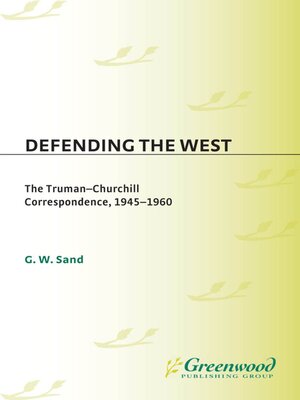Defending the West
ebook ∣ The Truman-Churchill Correspondence, 1945-1960 · Contributions to the Study of World History
By Gregory W. Sand

Sign up to save your library
With an OverDrive account, you can save your favorite libraries for at-a-glance information about availability. Find out more about OverDrive accounts.
Find this title in Libby, the library reading app by OverDrive.



Search for a digital library with this title
Title found at these libraries:
| Library Name | Distance |
|---|---|
| Loading... |
This work provides a documentary record of the correspondence, official and private, between Harry S Truman and Winston Churchill, from Truman's accession to the presidency in April 1945. Official communications between the two resumed during Churchill's second premiership (1951-1955) and more personal correspondence would continue into Churchill's retirement. Subjects of note range from events surrounding German surrender to the Cold War.
Completing previously published wartime correspondence between Churchill and Roosevelt up to the latter's death in 1945, this material records the thoughts and decisions of Truman and Churchill from April 12, 1945, nearly a month before Germany's surrender, until Churchill's defeat in the General Election in late July at Potsdam, shortly before the dramatic close of the Pacific war against Japan little more than a fortnight later. The two would subsequently maintain personal contact, first as associates and later as friends, a situation shaped by their meeting at Fulton, Missouri, where Churchill would deliver his famed Iron Curtain speech.
Completing previously published wartime correspondence between Churchill and Roosevelt up to the latter's death in 1945, this material records the thoughts and decisions of Truman and Churchill from April 12, 1945, nearly a month before Germany's surrender, until Churchill's defeat in the General Election in late July at Potsdam, shortly before the dramatic close of the Pacific war against Japan little more than a fortnight later. The two would subsequently maintain personal contact, first as associates and later as friends, a situation shaped by their meeting at Fulton, Missouri, where Churchill would deliver his famed Iron Curtain speech.







